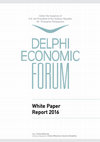Papers by Iacovos Sterghides

There have been few times in recent European history that the prospects of further EU integration... more There have been few times in recent European history that the prospects of further EU integration seemed so grim, and that the future of the Union looked – on the whole - so uncertain. Within Europe, the centrifugal forces pushing the member-states at the opposite direction than an ‘ever closer Union’ have multiplied. This ‘tug-of-war’ is revolving around the financial crisis and the European economic slowdown; the migration and the refugee crises; new waves of nationalistic retrenchment; and an environment of shared hard security threats such as international terrorism, regional instability, and conflict. In the EU today, nothing seems to be stable and guaranteed: the Euro Zone; the Schengen Zone; the United Kingdom’s membership; and the membership of other Central and Peripheral - Mediterranean member states, are all now questioned. Topping that, we have the following paradox: in what is a series of critical crises with profound economic, social, political and security ramifications whose resolution requires ‘more Europe’ and greater deepening, Europe seems to be answering with steps back jeopardising its very cohesion in the process. Unilateral actions such as border closures and the undermining of the Schengen and other core EU agreements; referenda that have direct implications for the EU’s unity and stability; and far-reaching divisions, driven by self-interest, over central issues such as the peace in the neighbourhood and a decisive resolution of the refugee crisis, are some of the highlights that make up the current EU predicament. The global geo-economic and geo-political context are not working in Europe’s favour either. The Union’s safety and economic prosperity very much depends upon advantageous milieu shaping in its near abroad and in its Eastern, Eurasian and Mediterranean neighbourhoods. In particular, the largely unfortunate conclusion of the so-called ‘Arab Spring’ left Europe’s Middle East and Mediterranean neighbourhood more unpredictable, more unstable and more vulnerable. For Europe, these multiple crises, and the Syrian crisis in particular, are directly linked with an unprecedented migration and refugee crisis. A crisis that is testing the very limits of Europe’s external borders – Greece above all. Simultaneously the ‘refugee crisis’ is testing the limits of EU solidarity, its commitment to its aquis, ideas and values.
ELIAMEP Crisis Observatory Opinion Article, 2013
After six years of recession in Greece and while its economy is in a downward spiral, accompanied... more After six years of recession in Greece and while its economy is in a downward spiral, accompanied with far reaching implications for both society and the political system, it is now obvious that the challenge of growth has become an existential issue for the country. Given the central European choices, which are not expected to change significantly, at least in the short-run, it is clear that the economic tools proposed by Keynes are nowhere on the horizon of the European agenda. Therefore, in order to stimulate the economy in such conditions of austerity, policies must be sought that will be adapted to the limited liquidity of the banking system and the central government. The considerations listed below are not necessarily novel or new. We simply attempt a more comprehensive and centralized approach.










Uploads
Papers by Iacovos Sterghides